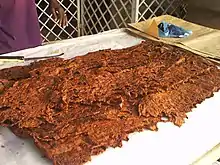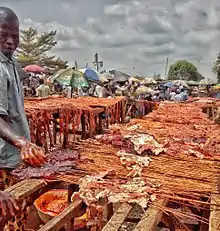 Kilishi | |
| Alternative names | Kilichi |
|---|---|
| Place of origin | Hausaland |
| Main ingredients | Dried meat (cow, sheep or goat meat) |
Kilishi is a version of jerky that originated in Hausaland which consists of most of Southern Niger and Northern Nigeria. It is a dried form of meat, typically made with beef, Lamb and mutton or chevon.
Origin
Kilishi, believed to originate from the Hausa people in Niger, has transcended its regional roots, gaining popularity throughout the entire Hausaland (Southern Niger and Nothern Nigeria). Its appeal extends further, with widespread consumption in Cameroon, Chad, and across the broader region.[1]
Preparation
It is prepared by drying thin strips of meat in the sun, generally beef but also camel, lamb, and goat. These strips are then coated in a paste made from peanuts and various condiments and vegetables, including onion and several spices. The resulting product is left to dry for a few hours in the sun and then roasted for a few minutes over high heat. There are significant variations in preparation methods across the region.[2] Kilishi was born out of necessity, to preserve meat for longer as the lean meat supplies protein enough for merchants traveling through the Sahara for trade.[3][4]
Kilishi can be kept for months without much change in its original taste.[5][6]
Labu

The paste used in making Kilishi is called labu. It is prepared by diluting groundnut paste with water. Spices, salt, ground onions, and sometimes sweeteners such as honey are added for flavor. A more natural way to add sweetness is with date fruit. The dried "sheets" of meat are then immersed one by one in the labu paste to coat them before being left to dry for hours. [7][8][9]
References
- ↑ Qualité liée à l’origine et Indications Géographiques en Afrique de l’Ouest et du Centre (PDF), 2012, p. 24, retrieved 2023-12-28
- ↑ "How To Make Kilishi (Nigerian Beef Jerky)". The Guardian Nigeria News - Nigeria and World News. 2021-04-04. Retrieved 2022-06-15.
- ↑ Kitchen-Butterfly/197573113935 (2017-03-04). "On Kilishi: With Tigernuts & With Peanuts". Kitchen Butterfly. Retrieved 2022-06-15.
{{cite web}}: CS1 maint: numeric names: authors list (link) - ↑ "Kilishi". www.localguidesconnect.com. 2021-06-08. Retrieved 2022-06-15.
- ↑ "Special report: Kilishi, Nigeria's meat of possibilities (video documentary) - Nigeria Today". 30 April 2016. Archived from the original on 5 March 2017. Retrieved 7 July 2016.
- ↑ "Nigeria: Kano - Kilishi is Everything to the People". Retrieved 7 July 2016.
- ↑ Kitchen-Butterfly/197573113935 (2015-05-15). "The Art, Science & Beauty of Kilishi". Kitchen Butterfly. Retrieved 2022-06-15.
{{cite web}}: CS1 maint: numeric names: authors list (link) - ↑ "Production of killishi". ResearchGate.
- ↑ Shama, Binta (2020-06-15). "Kilishi technology, a positive impact on Nigeria's GDP?". Blueprint Newspapers Limited. Retrieved 2022-06-15.
See also